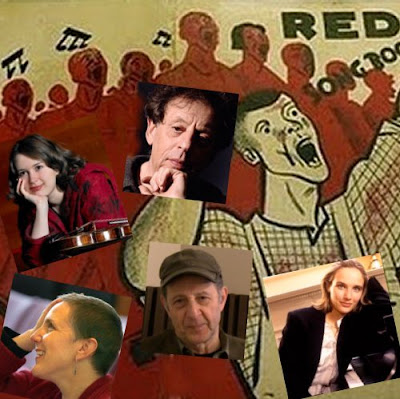Following in Olivier Messiaen's footsteps

In 1968 pianist Jean-Rodolphe Kars was awarded first prize in the Concours de Piano Olivier Messiaen. During his international career Kars recorded Debussy and Delius for Decca and an LP of Schoenberg's solo piano music for EMI. As well being acclaimed for his interpretations of Ravel and Debussy Kars established a reputation as a Messiaen specialist. He has recorded Messiaen, has lectured and written about the mystical aspects of the composer's music, and considers Messiaen to be his 'first spiritual father'. But despite this Kars, who lives in France, is virtually unknown today.
Jean-Rodolphe Kars' parents were non-practising Viennese Jews who fled to India following the Anschluss in 1938. Kars was born in 1947 and the following year the family moved to France. From 1967 onwards he followed a career as an international concert pianist. But, influenced by the faith of Messiaen and by a religious epiphany, Kars converted to Catholicism in 1977. Two years later he received a call to the priesthood, abandoned his career as a concert pianist and started studying theology.
In 1986 Jean-Rodolphe Kars, who is seen in my header montage, was ordained as a priest in Paray-le-Monial after entering the Emmanuel Community and continues to serve there today. Although he has not appeared as a concert pianist for thirty years Kars continues to give occasional lecture recitals on Messiaen and, in a fascinating twist in the path, has recently released a CD which does not contain a note of Messiaen's music. Below is the sleeve which is followed by an extract from the notes for this thought-provoking and important disc.

Jean-Rodolphe Kars has rediscovered his Jewish identity in a deeper way. He has listened and has become familiar with some of the wonderful Jewish songs from the Hasidic repertoire, and has made personal arrangements of them for the piano. Here he gives a very personal interpretation, turned towards the mysteries of the Catholic faith, without giving up the original spirit of the source of the music.Nostalgia and exuberance alternate on this beautifully shaped and performed CD released by Editions de l'Emmanuel. It comes with excellent and English and French notes by Jean-Rodolphe Kars and as a bonus concludes with a ten minute composition by the pianist inspired by Hasidic themes. The music of the southern Sephardic Jews has now reached a wide audience thanks to the early music movement, and this CD uncovers new musical riches from the northern reaches of Judaism.
Musique Juive Hassidique has been one of my discoveries of 2009 as is evidenced by its many return visits to my CD player. But here is the rub; like many good things Musique Juive Hassidique is rather difficult to get hold of. I cannot find any trace of it on Amazon or other major online resellers and it does not seem to exist in the parallel universe of MP3 downloads. But it can be bought from the French website of Maison de l'Emmanuel and other resellers in France.
I discovered the CD and bought it for 14 euros from the excellent shop at L'Abbaye Sainte Madeleine at Le Barroux. The monastery has an online shop, but if French websites phase you email them write in English which they can handle (tip, the French for email is courriel). I have made purchases from the shop using email without problems, but you will have to pay shipping. Another discovery in the shop at L'Abbaye Sainte Madeleine generated a lot of interest here earlier this year, the music of Armenia Sacra.

On the back cover of the Musique Juive booklet is a reproduction of a painting by Bencjon Benn (1905-1989). Born to Jewish parents in Belostock near Poland's border with Belarus, Benn was imprisoned in 1941 and went underground after his release. This experience prompted him to study and contemplate the Psalms and between 1955 and 1960 he produced a series of 150 painting, each one illustrating one verse from a psalm. Above is the painting inspired by Genesis 8:11 - 'And the dove came back to him in the evening, and lo, in her mouth a freshly plucked olive leaf, so Noah knew that the waters had subsided from the earth'. More music and images inspired by divine revelation in the story of a 20th century composer who influenced Messiaen, Charles Tournemire.
* I will be playing Musique Juive on Future Radio on December 26th in my A World of Music programme which also be available as a podcast. More from A World of Music here.
My header montage uses a rare photo of Jean-Rodolphe Kars from the website of Vincent P. Benitez at Pennsylvania State University; the score is Messiaen's Les Yeux Dans Les Roues from from his Livre d'Orgue. Any copyrighted material on these pages is included as "fair use", for the purpose of study, review or critical analysis only, and will be removed at the request of copyright owner(s). Report broken links, missing images and errors to - overgrownpath at hotmail dot co dot uk









Comments